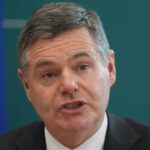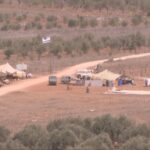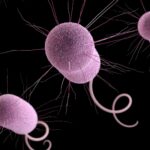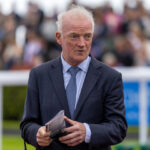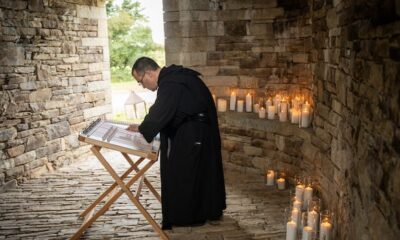Health
Paying tribute to David Nabarro
Read more on post.
It is with great sadness that the World Health Organization mourns the passing of Dr David Nabarro on Friday 25 July at his home. He was 75. At WHO, David was at the forefront of multiple areas of work, including malaria control, humanitarian crisis response and outbreaks. Most recently, David served as a WHO Special Envoy on COVID-19. To all who knew him, David was a widely respected, impactful and loved champion of health, equity and disadvantaged people worldwide, who supported many in their career development with his vision, skill, compassion and patience.
In a statement, WHO Director-General Dr Tedros Adhanom Ghebreyesus said he was “Deeply shocked and saddened by the passing of our dear friend, colleague and WHO Envoy David Nabarro. David was a great champion of global health and health equity, and a wise, generous mentor to countless individuals. His work touched and impacted so many lives across the world. On behalf of WHO, I’m extending our heartfelt condolences to David’s family, friends and colleagues. Rest in peace, my dear friend. We will dearly miss your expertise, wisdom and kindness.”
David wore many hats, reflecting his expertise, energy and readiness to help across a wide range of sectors, including health, nutrition and climate change.
From 1999-2005, David held senior leadership positions at WHO, starting as the Executive Director responsible for the Roll Back Malaria Project and the Office of the Director-General, before being appointed the Director-General’s Special Representative for Health Action in Crises.
In 2005, he joined the United Nations, serving as UN System Senior Coordinator for Avian and Pandemic Influenza (2005-2014), the UN Secretary-General’s Special Representative for Food Security and Nutrition (2008-2014), Coordinator of the Movement for Scaling Up Nutrition (2011-2014, as Assistant Secretary-General), the UN SG’s Special Envoy for the West Africa Ebola Outbreak Response (2014-2015), and Special Adviser for the 2030 Agenda for Sustainable Development and Climate Change (2016 – 2017, as Under-Secretary-General).
In 2015, the WHO Director-General appointed David as chair of the expert group on the reform of WHO’s work on outbreaks and emergencies in 2015.
In October 2018, he received the World Food Prize for leadership on nutrition.
David was Co-Director (from mid-2019-2025) and Chair of Global Health at the Institute of Global Health Innovation, Imperial College, London. He also founded and was Strategic Director of the Swiss-based 4SD Foundation (Skills Systems and Synergies for Sustainable Development) with Florence Lasbennes in 2018, training and mentoring leaders for sustainable development.
Between 2018 and 2025, David curated the Food Systems Dialogues as a contribution to the transformation of food systems. He also contributed to preparations for the UN’s September 2019 Climate Action Summit and co-facilitated the coalition that advanced the Nature-Based Solutions (NBS) workstream (co-led by China and New Zealand). David co-chaired the forum on Climate Change and Health that completed its work at the World Innovation Summit for Health in November 2020.
In March 2020, David was appointed Special Envoy of WHO Director General on COVID-19, a position that he held until his passing on 25 July 2025. Under his strategic leadership, 4SD led the Summit Dialogues that contributed to the 2021 UN Food Systems Summit from which a network of National Convenors of Food Systems transformation has emerged and continues to be active today.
When the Ukraine war began, David joined the UN Secretary-General’s Food, Energy and Finance crisis response group, co-leading the Food Workstream. King Charles III knighted David in 2023 for his contributions to global health.
In a statement titled “A Difficult Announcement,” the 4SD Foundation said David passed at his home on Friday 25 July.
“David’s generosity and unwavering commitment to improve the lives of others will be sorely missed. He leaves behind his beloved wife, Flo, his children, Tom, Ollie, Polly, Josie, Lucas and seven grandchildren. The family is comforted by the support and compassion extended to them as they navigate this difficult time,” the statement said.
On 30 July, David’s family issued a statement saying: “We are deeply grateful for the outpouring of tributes to David, and for the kindness to all who mourn his passing. Across the fields of international development, especially public health, food systems transformation, nutrition and crisis response, we are proud to see how his legacy will continue through so many compassionate leaders working to shift systems from within.”
A small, private funeral will be held with close family on Monday 4 August. In the weeks ahead, a number of memorial services will take place to enable those whose lives David has touched to pay their respects.
Memorial web page to leave messages, memories and mementos
Updates on further arrangements
Health
Press Release OHCAR annual report 2024
Read more on post.
Bystander CPR in cases of out-of-hospital cardiac arrest in this country increased by 24 per cent between 2012 and 2024. Bystander CPR happens when someone who has witnessed or comes across a cardiac arrest steps in to provide CPR.
Overall, in 2024 there were 2,885 cases of out-of-hospital cardiac arrests where resuscitation continued after the arrival of the Emergency Medical Services.
The figures are contained in the 2024 annual report of the Out-of-Hospital Cardiac Arrest Register (OHCAR) which has been published by the National Ambulance Service.
Of the 2,885 patients, 68 per cent were male and the median age was 68 years – patients ranged in age from less than one year to over 100 years of age. Women who suffered a cardiac arrest were on average older by 5 years than men (71 years vs. 66) and the majority or 68 per cent of all cardiac arrests happened in the home.
Of the 2,885 people who suffered an out-of-hospital cardiac arrest where resuscitation was attempted, 232 individuals or 8.0 per cent survived to leave hospital alive, according to the report.
Bystander CPR was attempted in 84% of cardiac arrests in 2024 which were not witnessed by members of the Emergency Medical Services.
Attempted defibrillation before the arrival of Emergency Medical Services has increased to 12% of all patients (n=339/2,885).
Latest figures show that defibrillation was attempted in 962 cases last year and that 35% of those attempts were made prior to the arrival of the Emergency Medical Services (n=339/962), highlighting the valuable life-saving work of First Responders in the community.
First Responders can include members of the general public, off-duty healthcare workers, members of Community First Responder groups, Local Authority Fire Services, voluntary organisations (such as the Irish Red Cross, Order of Malta, St. John Ambulance, and the Irish Coast Guard), auxiliary services such as Civil Defence and members of An Garda Síochána.
Community First Responders and other First Responders play a very important role in supporting the delivery of prehospital emergency care in local communities.
Professor Conor Deasy, Chair of the OHCAR said: “It’s great to see that bystander CPR in cases of out-of-hospital cardiac arrest in this country increased by 24 per cent between 2012 and 2023. In line with previous years, surviving patients were more likely to be younger and have been witnessed to collapse in a public urban location. Knowing what to do; ring 999/112, put your phone on a speaker while speaking to the 999 Call Taker and start chest compressions.’’
“Members of the public defibrillated 339 patients, of whom 90 survived (27%). This achievement emphasises the importance of Community First Responders and Public Access Defibrillators in saving lives.”
The OHCAR is hosted and funded by the National Ambulance Service (NAS) and captures the work of EMTs, Paramedics and Advanced Paramedics working for the National Ambulance Service, Dublin Fire Brigade and Airport Fire and Rescue Service, Dublin Airport – aiming to improve outcomes in Ireland for this extreme emergency by continuous evidence based performance measurement and feedback to service providers and the broader community.
Last updated on: 24 / 09 / 2025
-
Breaking News1 day ago
Barack Obama to be conferred with freedom of Dublin at ceremony on Thursday
-
Culture1 day ago
Taylor Swift’s new cinema outing generates more than €12million in just 24 hours
-
Travel & Lifestyle2 days ago
The Best Way to See Rome? On a Running Tour at Sunrise
-
Culture1 day ago
Milan Fashion Week 2025: Unmissable shows and Giorgio Armani in mind
-
Politics1 day ago
European Parliament snubs Orbán with vote to shield Italian MEP from Hungarian arrest
-
Business9 hours ago
Households to be offered energy bill changes, but unlikely to lead to savings
-
Opinion2 days ago
Saving the best for last: How the Making In symposium left an indelible mark
-
Culture2 days ago
Marvel stars Mark Ruffalo and Pedro Pascal stand up for Jimmy Kimmel as Disney boycott intensifies


